Why Siamese Cats Are So Vocal From a Cat Lover’s Perspective
Curious why Siamese cats are so talkative? This blog explores their vocal nature from a cat lover’s perspective, what it means, why it happens, and how to embrace the chatter.
BREEDSCAT
Jackie P.
If you’ve ever lived with a Siamese cat, you already know one thing for sure: they love to talk. I mean, really talk. Not a soft meow here or there, but full-on conversations, dramatic yowls, and persistent chatter that doesn’t let up. As someone who has lived with not one, but two Siamese cats, I can tell you: the rumors are true. These cats are loud, expressive, and never shy about sharing their opinions.
But why are Siamese cats so vocal? And what does it mean when they just won’t stop talking?
Let’s dive in.
A Breed That Talks Back
One of the first things I learned after adopting my first Siamese, Luna, was that silence was no longer part of my home life. From the moment I brought her home, she let out a series of meows so dramatic I thought something was wrong. It turns out she was just saying hello.
Siamese cats are known for being one of the most vocal breeds in the world. This is no accident. The breed has been selectively bred not only for their beautiful blue almond-shaped eyes and sleek coats but also for their social and communicative nature. Their vocalizations are one of their defining characteristics, often described as sounding like a crying baby or even a demanding toddler.
It’s All About Connection
In my experience, Siamese cats don’t meow for the sake of making noise. They talk because they want to connect. When Luna wants food, she’ll let me know with specific sounds. When she’s bored, she’ll meow in a completely different tone. When I’ve been gone too long? There’s a whole dramatic monologue waiting for me at the door.
Siamese cats are people-oriented. They form strong bonds with their humans, and they rely on vocal communication to interact. Where some cats might stare or nudge you, a Siamese will speak up. Loudly.
Intelligence Plays a Role
I’ve always believed that Luna was smarter than most cats I’ve known. She seems to understand routines, pick up on moods, and even knows how to manipulate the humans in the house with well-timed vocal outbursts. And it turns out, there’s science to back this up.
Siamese cats are highly intelligent, and with that intelligence comes a desire for mental stimulation. They get bored easily, and when they do, they’ll often express that boredom vocally. If I forget to rotate her toys or take time to play, she lets me know.
The talking isn’t just random; it’s often a sign of their mental engagement or frustration. Once I started viewing her constant chatter as communication rather than just noise, it helped me respond in a more thoughtful way.
Not All Meows Are the Same
Over time, I began to recognize different vocal patterns. There’s the short, polite meow when she wants attention. There’s the longer, wailing meow when she’s hungry. There’s even a chirp-like sound she makes when watching birds through the window. Every sound has a purpose.
Some Siamese cat owners report that their cats even mimic human speech patterns or seem to respond with “words.” While that might be a bit of an exaggeration, it really does feel like a two-way conversation.
The Downside of a Talkative Cat
As much as I adore Luna’s personality, I’ll admit her constant vocalizing can be a bit much. Especially at night. If she doesn’t get enough attention during the day, or if her evening routine is disrupted, she’ll yowl outside my door like it’s the end of the world.
That’s the flip side of having a chatty cat. Their need for attention, companionship, and stimulation means they don’t like being ignored. If you’re thinking about getting a Siamese, be prepared for a cat that wants to be involved in every part of your life and isn’t shy about saying so.
Tips for Living with a Vocal Siamese
If you’re already the proud parent of a Siamese (or considering becoming one), here are a few tips from my own experience:
Engage with them often: They don’t just want attention, they crave it. Regular play sessions, affection, and conversation (yes, talking back helps) can reduce excessive meowing.
Stick to a routine: These cats thrive on structure. Feeding, playtime, and sleep should happen at regular times. If you’re late? You’ll hear about it.
Don’t reward constant meowing: Sometimes, it’s important not to encourage every vocal demand. Pick your battles.
Provide stimulation: Toys, climbing trees, puzzle feeders, anything that keeps their minds active, helps cut down on boredom-driven chatter.
Final Meow
Living with a Siamese cat is like having a very opinionated, furry roommate who always has something to say. But honestly? I wouldn’t trade it for the world. There’s something deeply endearing about the way they communicate. It makes you feel like you're not just a pet owner, you’re a partner in their little feline world.
So, if your Siamese won’t stop talking, listen closely. They might be telling you they’re happy, hungry, bored, or just that they missed you. And really, isn’t that kind of wonderful?
Kitty Catz
Follow Kitty Catz on social media for purrfect updates and blog highlights!
© 2025-2030. All rights reserved.



